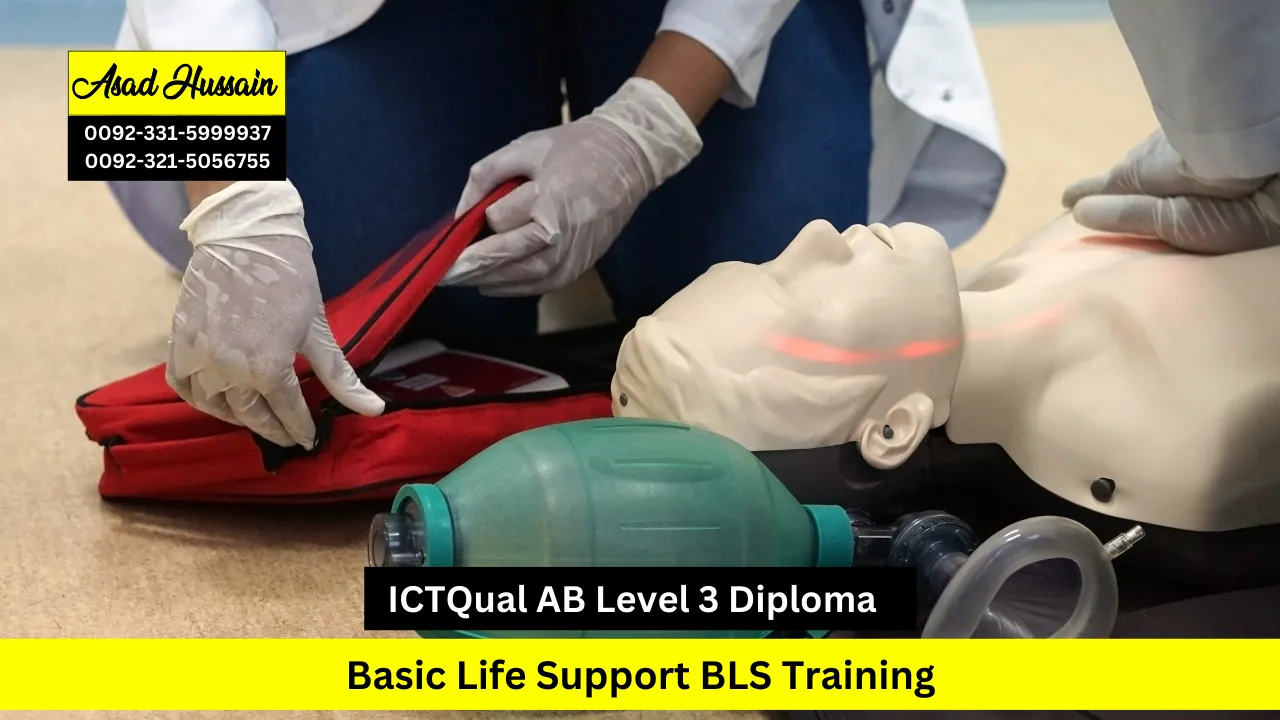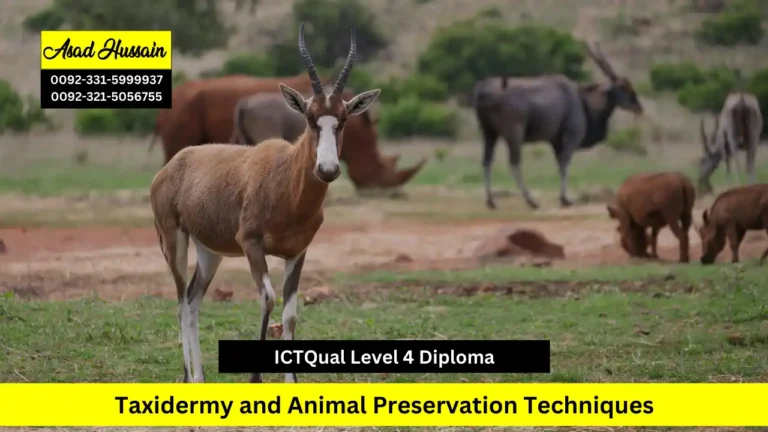Basic Life Support (BLS) is a critical skill that saves lives in emergencies such as cardiac arrest, choking, or respiratory failure. The ICTQual AB Level 3 Diploma in Basic Life Support (BLS) Training is a comprehensive program designed for healthcare professionals, first responders, and individuals seeking to develop essential life-saving skills. This course provides both theoretical knowledge and hands-on practical training to ensure learners are confident and competent in performing BLS in a variety of emergency situations.
The ICTQual AB Level 3 Diploma in Basic Life Support BLS Training covers core topics including cardiopulmonary resuscitation (CPR), automated external defibrillator (AED) usage, airway management, and emergency response protocols. Learners will also understand the chain of survival, risk assessment, and techniques to assist patients in critical conditions safely and effectively. Through interactive simulations and practical exercises, participants gain the confidence to respond swiftly and accurately during real-life emergencies.
By completing the ICTQual AB Level 3 Diploma in Basic Life Support (BLS) Training, learners will develop the essential skills to confidently assess a variety of emergency situations and provide immediate life-saving interventions. Participants will be trained to perform high-quality chest compressions, deliver effective rescue breaths, and operate automated external defibrillators (AEDs) and other critical emergency equipment accurately and safely.The course curriculum places strong emphasis on safety, ethical considerations, and adherence to internationally recognized guidelines and protocols, ensuring that learners act in full compliance with professional standards. Graduates will also gain the ability to make quick, informed decisions under pressure, prioritize actions in multi-casualty or high-stress scenarios, and collaborate effectively within emergency response teams.
Graduates of the ICTQual AB Level 3 Diploma in Basic Life Support (BLS) Training will be fully equipped to respond confidently and effectively to a wide range of medical emergencies across healthcare settings, workplaces, and community environments. They will acquire practical skills in cardiopulmonary resuscitation (CPR), airway management, the use of automated external defibrillators (AEDs), and emergency response protocols, enabling them to act swiftly and competently during critical situations.This diploma is particularly suited for healthcare professionals, first responders, educators, and community safety personnel who aim to enhance their qualifications, expand their skill set, and deliver life-saving interventions with accuracy and confidence. Graduates will also develop the ability to assess emergency situations, prioritize actions, and collaborate effectively with teams, thereby improving patient outcomes and contributing to safer environments.
Program Highlights
- Comprehensive Emergency Life Support
- Advanced Airway and Respiratory Management
- Trauma Life Support and Multi-System Emergencies
- High-Performance Resuscitation Techniques
- Pharmacological Interventions in Life Support
- Leadership, Crisis Management, and Team Coordination
To enroll in the ICTQual AB Level 3 Diploma in Basic Life Support (BLS) Training, applicants should meet basic age, educational, and language requirements. These criteria ensure learners are prepared to understand key life-saving concepts, perform practical skills safely, and respond effectively in emergency situations.
Age Requirements
- Applicants must be at least 16 years old to enroll in the program.
- Mature learners interested in healthcare or first aid roles are encouraged to apply.
Educational Requirements
- A basic understanding of health and science concepts is recommended but not mandatory.
- Learners with prior qualifications in first aid, health, or social care will benefit from faster comprehension of course materials.
Professional Experience for ICTQual AB Level 3 Diploma in Basic Life Support BLS Training
- No prior professional experience is required, making the course suitable for beginners.
- Healthcare assistants, volunteers, and workplace first responders can use this course to enhance practical life-saving skills.
English Language Proficiency
- Learners should have a functional understanding of English to comprehend theoretical concepts and follow practical instructions.
- Non-native English speakers may provide evidence of basic English proficiency through prior education or assessments.
The ICTQual AB Level 3 Diploma in Basic Life Support (BLS) Training equips learners with essential knowledge, practical skills, and professional competence to respond effectively in life-threatening emergencies. Graduates will be able to perform life-saving interventions, support patients safely, and act confidently in high-pressure healthcare and community settings.
Comprehensive Emergency Life Support
- Understand the principles and protocols of emergency life support in various scenarios.
- Recognize signs of cardiac arrest, choking, and respiratory failure.
- Apply structured approaches for initial assessment and patient stabilization.
- Perform timely cardiopulmonary resuscitation (CPR) in accordance with international guidelines.
- Evaluate outcomes and adjust interventions as necessary during emergencies.
Advanced Airway and Respiratory Management
- Demonstrate correct techniques for airway clearance and respiratory support.
- Operate adjunct airway devices safely and effectively.
- Monitor oxygenation and ventilation during emergency care.
- Identify respiratory distress and implement immediate corrective actions.
- Maintain patient safety while providing advanced airway interventions.
Trauma Life Support and Multi-System Emergencies
- Assess and manage trauma cases involving multiple injuries.
- Apply hemorrhage control, immobilization, and shock management techniques.
- Recognize complications from multi-system injuries and respond appropriately.
- Coordinate emergency interventions with team members effectively.
- Understand ethical considerations and patient prioritization in trauma situations.
High-Performance Resuscitation Techniques
- Perform high-quality chest compressions and rescue breaths under pressure.
- Use automated external defibrillators (AEDs) correctly and efficiently.
- Integrate team-based resuscitation strategies for optimal outcomes.
- Evaluate resuscitation effectiveness using monitoring and feedback tools.
- Adapt resuscitation techniques to the patient’s age, size, and condition.
Pharmacological Interventions in Life Support
- Understand common emergency medications and their indications.
- Administer drugs safely following protocols and dosage guidelines.
- Monitor patient responses to pharmacological interventions.
- Identify potential side effects and take corrective action.
- Integrate medication use into comprehensive life support strategies.
Leadership, Crisis Management, and Team Coordination
- Lead emergency response teams effectively in high-pressure situations.
- Delegate tasks and maintain clear communication during crises.
- Coordinate multi-disciplinary care in emergency environments.
- Apply decision-making skills to prioritize actions and resources.
- Promote safety, compliance, and professional standards within the team.
Conclusion
Upon completing the ICTQual AB Level 3 Diploma in Basic Life Support (BLS) Training, learners will possess the skills, knowledge, and confidence to respond to a wide range of medical emergencies. Graduates will be equipped for roles in healthcare, workplace safety, and community first-response teams, contributing effectively to life-saving interventions and improved patient outcomes.
The ICTQual AB Level 3 Diploma in Basic Life Support (BLS) Training is designed for individuals who want to develop essential life-saving skills and respond confidently in emergency situations. This course is suitable for healthcare professionals, first responders, and anyone seeking foundational competence in emergency care, resuscitation techniques, and crisis management.
Educational Instructors and Trainers
- Educators seeking to teach basic life support and emergency response skills to students or staff.
- Trainers aiming to enhance their knowledge of BLS protocols and hands-on practice techniques.
Environmental Advocates and Activists
- Individuals involved in community safety and public health programs seeking emergency response competence.
- Advocates working in high-risk environments who want to be prepared for life-threatening situations.
Students and Recent Graduates
- Healthcare or medical students seeking practical BLS certification to complement their academic studies.
- Recent graduates aiming to enter healthcare, first aid, or emergency response roles.
Career Changers
- Professionals transitioning from other sectors into healthcare, first aid, or safety-critical roles.
- Individuals seeking recognized BLS certification to enhance employability and career development opportunities.
Policy Makers and Regulators
- Professionals responsible for developing, monitoring, or enforcing health and safety regulations.
- Decision-makers who need insight into frontline emergency response practices to guide policy and compliance.
Conclusion
This course is ideal for learners committed to acquiring life-saving skills and contributing to safer healthcare and community environments. Graduates will be equipped to respond effectively in emergencies, lead small teams during critical interventions, and pursue further training in advanced life support or healthcare careers.







